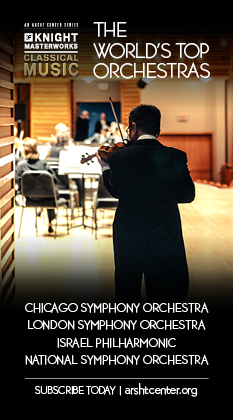Good vs. evil on the high seas, set to music by Britten
SANTA FE. While Peter Grimes was an instant success, Benjamin Britten’s second-most-performed opera, Billy Budd, took a while to secure its place in the repertoire. Even a forward-looking company like Santa Fe Opera waited decades for a first production, though the powerful, compelling staging presented Wednesday evening made up for its belated festival debut.
It’s easy to see the appeal of Herman Melville’s short novel for Britten, since the tale of the innocent young sailor Billy Budd is replete with the English composer’s favored themes: loss of innocence, the conflict between duty and what is just, the thin line between male camaraderie and intimacy, and the destruction of goodness by calculating evil.
Robert Innes Hopkins’ set for the HMS Indomitable is a narrow ship’s bow—claustrophobic for the cramped morality within— and a steeply raked deck that rises to reveal the sailors’ quarters underneath. Rick Fisher provides some astonishing lighting effects with the long shadows of Captain Vere and his lieutenants as they judge Billy’s fate, and in the final scene, where high above the elderly Vere is the silhouette of the hanging Billy forever haunting him.
Teddy Tahu Rhodes has the youthful demeanor and slender good looks for the “beauty” Billy, the pure-hearted able seaman who charms the crew and whose nervous stutter when unjustly accused of mutiny leads to his tragedy. The New Zealand baritone possesses an easy stage presence and the athleticism for the role, displayed in his rapid scamper up the high rigging.
In this role debut, Rhodes is an admirable Billy yet his performance seems to be finding its sea legs. Rhodes’ warm, focused baritone was best in the forthright moments: his buoyant cheer in Act 1, the lively sea shanty, and the confrontation with the villainous Claggart, where he managed to make Billy’s stammer credible yet still musical.
What was lacking were the epic dimensions and inevitable sense of Billy’s tragedy. The final scene was sensitively sung, yet that affecting soliloquy should break your heart; instead, you find yourself admiring the dark timbre of Rhodes’ voice rather than being moved by Billy’s impending execution. But it’s a worthy first outing of a difficult role for which Rhodes is clearly well suited and into which he will no doubt grow with future performances.
As the villainous Claggart, Peter Rose provides ample contrast to Rhodes’ Billy. Rose’s portly, tightly buttoned master-at-arms is a walking mountain of repression, as rotund and unprepossessing as Rhodes’ Billy is lean and hearty. Rose’s black bass-baritone almost seemed an aural manifestation of Claggart’s evil, and with finely calibrated singing, Rose starkly conveyed the master-at-arms’ self-loathing, jealousy and longing for Billy, and his determination to destroy him.
William Burden was an unusually youthful Captain Vere, but his vibrant tenor and dramatic insight contributed much to the success of the production. Burden’s “starry Vere’ is less reserved than most but still the dignified officer whose judgment of Billy impacts his life. Burden made Vere’s conflict emotionally wrenching as the authority figure who is aware of Billy’s innocence but unable to go against his code of duty.
It’s not often that people walk out of this opera buzzing about the role of the Novice, but Keith Jameson’s extraordinary performance as the weak, abused sailor was a high point of the evening. With his clear, penetrating tenor and nervous, fearful characterization of the flogged victim, Jameson’s performance was beautifully sung and dramatically riveting (also nicely enhanced by Britten’s imaginative scoring for mournful saxophone).
The rest of the large all-male cast was vocally strong and well-suited to their roles, particularly Thomas Hammons’ sympathetic old tar Dansker, Timothy Nolen as Flint, Richard Stilwell as Redburn, John Stephens as Ratcliffe, and John Duykers as the unwilling Red Whiskers.
Paul Curran’s direction was fluid and unobtrusive with the shipboard bustle and ensemble scenes exciting, aided by rousing choral work elicited by Susanne Sheston. There were two directorial miscalculations: making the sexual undertones into a jarring overtone with Billy at one point attempting to kiss Dansker seemed like gilding the homoerotic lily. And in the sea shanty, having the tough sailors morph into a rhythmic line of dancing chorus boys provoked unintentional Forbidden Broadway-like mirth.
After some rough-hewn Mozart the previous evening, the Santa Fe Opera Orchestra returned to their standard of lean, polished brilliance. Chief conductor-designate Edo de Waart led a concentrated, atmospheric account of Britten’s subtle, remarkable music that allowed all the briny color and scoring felicities to register naturally without exaggeration.
Billy Budd has two more performances, August 14 and 21. Tickets are $25-$180. 505-986-5900, 800-280-4654; www.santafeopera.org
[Pictured: Peter Rose as Claggart and Teddy Tahu Rhodes as Billy Budd. Photo by Ken Howard for Santa Fe Opera.]
Posted in opera review, Performances
One Response to “Good vs. evil on the high seas, set to music by Britten”
Leave a Comment
Thu Aug 7, 2008
at 8:30 am
1 Comment





Posted Aug 09, 2008 at 11:46 am by Jorge 176
Great review, wish I could have been there.
jorge 176